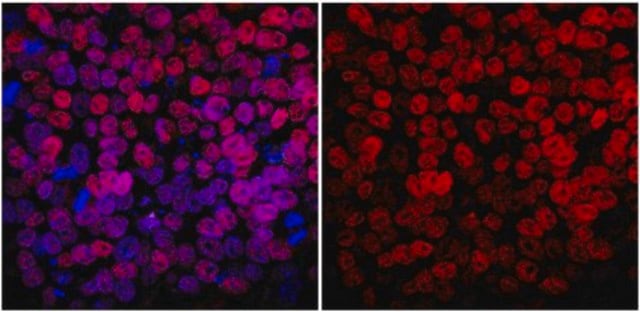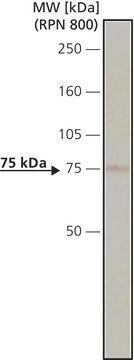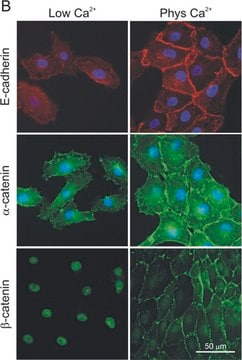MAB5782
Anti-NMDAR2B Antibody, NT
ascites fluid, clone 1A8.9B3, Chemicon®
Sign Into View Organizational & Contract Pricing
All Photos(1)
About This Item
UNSPSC Code:
12352203
eCl@ss:
32160702
NACRES:
NA.41
Recommended Products
biological source
mouse
Quality Level
antibody form
ascites fluid
clone
1A8.9B3, monoclonal
species reactivity
human, rabbit, fish, rat, mouse
manufacturer/tradename
Chemicon®
technique(s)
western blot: suitable
isotype
IgG1
NCBI accession no.
UniProt accession no.
shipped in
dry ice
target post-translational modification
unmodified
Specificity
NMDAR2B, N-terminal. By Western blot the antibody reacts with bands at ~170 kDa on rat brain lysate. Additional bands at ~116, 50 and 32 kDa may be seen depending on sample and antibody concentration used.
Application
Detect NMDAR2B using this Anti-NMDAR2B Antibody, N-terminal validated for use in WB.
Western blot: 1:100-1:1,000 on rat brain lysate.
Optimal working dilutions must be determined by end user.
Optimal working dilutions must be determined by end user.
Legal Information
CHEMICON is a registered trademark of Merck KGaA, Darmstadt, Germany
recommended
Product No.
Description
Pricing
Storage Class Code
10 - Combustible liquids
WGK
WGK 1
Flash Point(F)
Not applicable
Flash Point(C)
Not applicable
Certificates of Analysis (COA)
Search for Certificates of Analysis (COA) by entering the products Lot/Batch Number. Lot and Batch Numbers can be found on a product’s label following the words ‘Lot’ or ‘Batch’.
Already Own This Product?
Find documentation for the products that you have recently purchased in the Document Library.
Emilija Glavonic et al.
Pharmaceuticals (Basel, Switzerland), 17(6) (2024-06-27)
Fear-related disorders, including post-traumatic stress disorder (PTSD), and anxiety disorders are pervasive psychiatric conditions marked by persistent fear, stemming from its dysregulated acquisition and extinction. The primary treatment for these disorders, exposure therapy (ET), relies heavily on fear extinction (FE)
Andry Andrianarivelo et al.
Science advances, 7(43), eabg5970-eabg5970 (2021-10-21)
[Figure: see text].
D J Laurie et al.
Brain research. Molecular brain research, 51(1-2), 23-32 (1998-01-14)
Mouse monoclonal antibodies were raised against bacterially expressed protein sequences of the NR2A, NR2B, NR2C and NR2D subunits of the rat NMDA receptor. From immunoblots of rat brain proteins, the apparent molecular weights of these subunits were 165, 170, 135
Verónica Guirao et al.
Journal of neurochemistry, 143(3), 359-374 (2017-09-08)
The statin atorvastatin (ATV) given as a post-treatment has been reported beneficial in stroke, although the mechanisms involved are not well understood so far. Here, we investigated in vitro the effect of post-treatment with ATV and its main bioactive metabolite ortho-hydroxy
Núria DeGregorio-Rocasolano et al.
Antioxidants (Basel, Switzerland), 9(12) (2020-12-04)
Death-associated protein kinase 1 (DAPK1) is a pleiotropic hub of a number of networked distributed intracellular processes. Among them, DAPK1 is known to interact with the excitotoxicity driver NMDA receptor (NMDAR), and in sudden pathophysiological conditions of the brain, e.g.
Our team of scientists has experience in all areas of research including Life Science, Material Science, Chemical Synthesis, Chromatography, Analytical and many others.
Contact Technical Service![Anti-OCT-4 [POU5F1] Antibody, clone 7F9.2 clone 7F9.2, from mouse](/deepweb/assets/sigmaaldrich/product/images/307/874/7354f72d-80ee-40a5-b7fa-0590fe6784cc/640/7354f72d-80ee-40a5-b7fa-0590fe6784cc.jpg)






